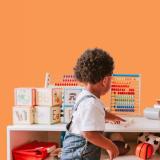The Australian Government is now in caretaker period. During this time, updates on this website will be published in accordance with the Guidance on Caretaker Conventions, until after the election.
Pneumonia is a lung infection that can be serious in young children. It can be caused by bacteria, viruses or fungi. People can develop pneumonia after they have common infections such a cold, the flu or respiratory syncytial virus.
People with pneumonia may have symptoms of a cold that get worse over time, rather than better. Symptoms of pneumonia include a moist cough, fever, tiredness and difficulty breathing.
How it spreads
The germs that cause pneumonia are generally common and spread from person to person, but only cause disease in a small proportion of people. Pneumonia is a significant disease in pregnancy and immunocompromised people.
Exclusion period
If a person has respiratory symptoms (cough, sneezing, runny or blocked nose, sore throat), exclude them only if:
- the respiratory symptoms are severe or
- the respiratory symptoms are getting worse (more frequent or severe), or
- they also have concerning symptoms (fever, rash, tiredness, pain, poor feeding).
Otherwise do not exclude.
A person often has an ongoing cough after they have recovered from a respiratory infection. If their other symptoms have gone and they feel well, they can return to the service.
Actions for educators and other staff
Follow the exclusion period in the Staying healthy guideline.
Ensure staff and children have good respiratory and hand hygiene.
Ensure staff use appropriate cleaning practices, as described in the Staying healthy guideline.
Actions for parents and carers
Take your child to see a doctor if you think they may have pneumonia. If your child’s pneumonia is caused by bacteria, they will need antibiotics. Follow your doctor’s treatment plan and keep your child at home until their symptoms have gone.
If your child still has a cough, but their other symptoms have gone and they feel well, they can return to the service.
Keep your child up to date with their recommended vaccinations. Vaccination can prevent some diseases that lead to pneumonia.
Teach your child to cough or sneeze into a tissue, then throw the tissue into a bin and wash their hands. If there are no tissues nearby, teach them to cough or sneeze into their inner elbow instead of their hands.
More information about pneumonia
See healthdirect for more information on prevention, diagnosis and treatment of pneumonia.
To find out if a child needs medical help, you can:
- use the health direct online symptom checker
- speak to a registered nurse by calling their 24-hour health advice hotline on 1800 022 222.


